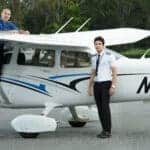Cadet Pilot Aptitude Test: The #1 Ultimate Guide to Pass CASS and COMPASS

Passing the Cadet Pilot Aptitude Tests is one of the most important steps in becoming a commercial pilot. Whether you’re applying through an airline cadet program or a partner flight school, you’ll likely face either the CASS or COMPASS test—two standardized assessments used to evaluate your readiness for flight training.
CASS (Computerized Aviation Selection System) and COMPASS (Computerized Pilot Aptitude Screening System) are designed to test skills like multitasking, hand-eye coordination, memory, numerical reasoning, and situational awareness. These tests simulate high-pressure cockpit environments to help airlines identify candidates with the right mindset and cognitive abilities.
This ultimate guide gives you proven tips to prepare, practice, and pass—so you can move one step closer to the cockpit with confidence.
Know Which Cadet Pilot Aptitude Test You’re Taking
Before starting any preparation, confirm whether your cadet program uses CASS or COMPASS—the two are not the same.
CASS is often used by airlines like IndiGo and evaluates multi-tasking, psychomotor skills, reaction time, and coordination using aviation simulators and custom software.
COMPASS is more academic, focusing on math, physics, logical reasoning, memory, and hand-eye coordination—usually through on-screen questions and joystick-based tasks.

Knowing the exact format helps you choose the right prep material and avoid wasting time on the wrong practice sets.
Understand the Core Skills Being Tested
Both tests go beyond academic performance. They’re designed to measure your cognitive and motor capabilities under pressure—the same skills required in a real cockpit. Expect to be tested on:
- Numerical and verbal reasoning
- Spatial orientation and mental rotation
- Short-term memory
- Multi-tasking and workload management
- Reaction time and motor coordination (especially in joystick-based simulators)
Understanding these skill areas helps you train with purpose. It’s not just about answering questions—it’s about building the mindset of a pilot.
Train Your Reaction Time and Coordination
In both CASS and COMPASS Cadet Pilot Aptitude Test, your motor coordination and response speed are critical. You may be asked to track moving targets, respond to changing lights, or manipulate controls while solving problems.
Here’s how to train effectively:
- Use joystick-based simulators or online tools that simulate dual-task scenarios.
- Practice hand-eye coordination games or apps designed for pilots and gamers.
- Focus on precision under pressure, not just speed—accuracy is just as important.
This kind of training builds the muscle memory and focus you’ll need in an actual cockpit environment.
Practice Mental Math and Logical Reasoning Daily
Expect to face multiple sections testing your numerical reasoning and logic under time pressure. Questions often include:
- Speed-distance-time problems
- Unit conversions
- Mental arithmetic
- Sequences and pattern recognition
Set aside 20–30 minutes daily to solve aviation-style math and logic exercises. Apps, books, and online prep platforms can help—but consistency is key.
Strong reasoning skills not only help you pass the test—they prepare you for split-second decision-making in the air.

Use Official Practice Tools for Cadet Pilot Aptitude Tests
One of the best ways to prepare for the Cadet Pilot Aptitude Tests is by using practice platforms that simulate the actual test environment. Many airline-approved prep sites offer modules for COMPASS and CASS, including real-style reaction tests, spatial reasoning, and multitasking drills.
Choose tools that match the format of your target airline. Practicing with authentic test simulations helps you build confidence and reduces surprises on test day.
If you’re unsure where to start, look for online platforms recommended by past cadets or mentioned by official training partners.
Build a Daily Routine Around Cadet Pilot Aptitude Test Preparation
Consistency beats cramming. Preparing for Cadet Pilot Aptitude Tests should be a part of your daily routine—not a last-minute sprint. Successful cadets often train for 2–3 weeks with focused daily sessions of 45 to 60 minutes.
Here’s a sample daily routine:
- 10 mins: Mental math or speed calculations
- 15 mins: Spatial reasoning and visual puzzles
- 20 mins: Joystick-based coordination exercises or multi-tasking apps
- 10 mins: Review and reflect on weak areas
By building discipline early, you’re not just preparing for the test—you’re building the mental stamina needed for life in the cockpit.
Improve Your Memory for Cadet Pilot Aptitude Tests
Short-term memory plays a big role in both CASS and COMPASS. During the Cadet Pilot Aptitude Tests, you may be asked to recall number sequences, flight data, or instructions while performing another task.
To strengthen this skill:
- Practice digit recall exercises (e.g., apps like Lumosity or Peak)
- Use dual-task drills, such as remembering instructions while solving logic puzzles
- Train your working memory with timed repetition and memory pattern games
Strong memory retention improves your multitasking ability and sharpens your ability to absorb checklists, ATC instructions, and cockpit data in real flight operations.
Simulate Test Conditions Before the Real Cadet Pilot Aptitude Tests
Don’t just prepare—rehearse the full experience. A week before your actual Cadet Pilot Aptitude Test, simulate the entire process under real test conditions:
- Limit distractions
- Time each section
- Use the same hardware (e.g., joystick, keyboard, or mouse you’ll be tested with)
- Sit upright and focus for the full duration, just as you will on test day
This not only builds mental endurance but also helps reduce anxiety. The more familiar the process feels, the more confident you’ll be when it counts.

Stay Calm Under Pressure During Cadet Pilot Aptitude Tests
One of the biggest reasons candidates underperform during Cadet Pilot Aptitude Tests is test-day anxiety. Even with solid preparation, high stress levels can impact coordination, reaction time, and memory recall.
To keep calm under pressure:
- Practice deep breathing techniques before and during breaks
- Visualize success—picture yourself calmly completing each section
- Avoid last-minute cramming; instead, focus on rest and clarity the day before
Cadet programs are looking for cool-headed decision-makers. Staying calm doesn’t just help you pass the test—it proves you’re cockpit material.
Review Your Performance and Focus on Weak Areas
Every cadet pilot applicant has strengths and weaknesses. The smartest way to improve is by tracking your performance across practice sessions and identifying specific areas to work on.
Keep a prep log that records:
- Which skill areas you struggled with (e.g., spatial awareness, math speed)
- Time spent on each task
- Your progress week by week
This helps you build a focused strategy rather than random practice. Honing your weak points gives you a distinct edge in passing the Cadet Pilot Aptitude Tests with confidence.
Conclusion: Pass Cadet Pilot Aptitude Tests with Focus, Not Luck
The Cadet Pilot Aptitude Tests—CASS and COMPASS—aren’t just entry barriers. They’re real-world indicators of how you’ll perform under pressure, in motion, and in the cockpit. With the right strategy, focused practice, and daily discipline, these tests become a skillset—not just an exam.
Use these tips to structure your prep, improve performance, and walk into your assessment with full confidence. Whether you’re aiming for IndiGo, AirAsia, or another cadet program, success starts here.
FAQs About Cadet Pilot Aptitude Tests (CASS & COMPASS)
What are Cadet Pilot Aptitude Tests used for?
They’re used by airlines and flight schools to screen candidates for cognitive skills, reaction time, hand-eye coordination, and multitasking—key traits required in real-world flying.
What’s the difference between CASS and COMPASS?
CASS focuses more on psychomotor and multitasking tasks, often with a joystick setup. COMPASS includes academic sections like math and physics, along with cognitive and coordination tests.
How do I prepare for Cadet Pilot Aptitude Tests?
Create a routine of daily practice involving mental math, spatial reasoning, multitasking simulations, and memory training. Use official or airline-specific tools whenever possible.
Are these tests difficult?
They’re challenging, but trainable. With 2–3 weeks of structured preparation, many candidates pass on their first attempt—especially those who focus on weak areas early.
How long do the Tests take?
Test durations vary by airline and provider, but typically range from 90 minutes to 3 hours, depending on the modules included.
Contact the Florida Flyers Flight Academy Team today at 91 (0) 1171 816622 to learn more about the Private Pilot Ground School Course.



Table of Contents






